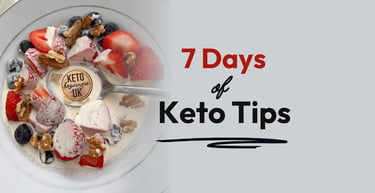How To Stop Emotional Eating On Keto
Keto may bring up your feelings - here's why it's a good thing and how to handle it.
Lisa Cherry Beaumont, Ketogentility.co.uk
10/27/20254 min read


Keto Isn’t Just Physical, It’s Emotional, Too
When starting a keto diet, the motive is often physical - we've put weight on or we've had a worrying diagnosis (or often both) - but what many of us fear is the wave of emotions that could come up once the usual carby comfort foods are gone.
After all, we're well aware that food isn’t just fuel. It’s comfort, distraction, celebration, and reward. For most of us, it’s been our main coping mechanism for decades. So when we remove the foods that gave us that quick emotional hit - the bread, the crisps, the chocolate, the wine... - what’s left is little old "us"… and the feelings we’ve been stuffing down.
This is one of the most powerful parts of the keto journey, and also one of the hardest. You’re not just changing your diet, you’re learning to sit with emotions rather than suppress them. You’re breaking patterns that might have been running since childhood.
When cravings take hold, it’s rarely just hunger. It’s comfort-seeking. It’s loneliness, boredom, stress, or even grief. And because carbohydrates trigger dopamine and serotonin, they’ve become an easy shortcut to feeling okay - for the moment. Keto takes that shortcut away, and that can leave you feeling exposed, emotional, or even angry at times.
But here’s the beauty in that: it’s healing. When you stay the course, your body starts healing, and so does your relationship with yourself. You begin to recognise the difference between physical hunger and emotional hunger. You learn new ways to self-soothe that don’t involve spiking your insulin. Your hormones begin to regulate, and you start to trust your body again.
And little by little, the emotions that once felt overwhelming become easier to manage - not because they disappear, but because you’ve developed the strength to face them without numbing out.
If you’re finding keto hard right now, know that it’s completely normal. You’re not failing; you’re feeling. And that’s a sign of deep progress, not weakness.
Why Fat Matters for Emotional Health
One of the reasons emotions can feel so unmanageable on a standard low-fat, high-carb diet is that the brain is literally starved of fat. The brain is about 60% fat by weight, and it needs dietary fat, especially saturated and omega-3 fats, to function optimally. Without it, the brain struggles to make and balance the neurotransmitters that regulate mood, focus, motivation, and calm.
When fat is replaced with carbohydrates, blood sugar and insulin levels rise and fall dramatically, creating chemical instability that can manifest as anxiety, irritability, brain fog, depression... For many people, that rollercoaster of sugar highs and crashes has been their emotional baseline for years, and so it’s no wonder difficult emotions feel unbearable.
Healthy fats, on the other hand, nourish and stabilise the brain. They are rich in vitamins and fatty acids vital for brain structure, communication between neurons, and emotional regulation.
As you reintroduce these healing fats and reduce inflammatory carbs and seed oils, your brain begins to rebuild and rebalance. Mood evens out. Anxiety lessens. The ability to face and process emotion, rather than react to it, naturally strengthens. Over time, you don’t just feel calmer because of willpower; you feel calmer because your brain chemistry is finally being supported by real food.
Coping with Emotions in the Early Keto Phase
The early stages of keto can feel raw, especially when you’ve used food to manage stress or soothe pain. Here are some ways to support yourself while your body and brain adjust:
Eat enough fat. Don’t skimp. If you’re hungry or emotional, you may not be eating enough. Fat is both fuel and comfort, and it stabilises mood.
Keep your minerals balanced. Low minerals can cause dehydration, mimic anxiety, and make you feel emotionally off. Use plenty of a good sea salt, grey salt, or Himalayan pink salt on your food.
Rest more than you think you need. Healing - physical and emotional - takes energy. Fat adaptation is demanding work for the body, so honour your body's signals that you need to rest.
Journal your feelings or talk to God. Instead of eating through emotions, express them. Writing or speaking helps you process and release them consciously.
Move your body gently. Walk, stretch, or dance. Movement helps regulate nervous-system energy that might otherwise push you toward food.
Have keto-friendly comfort options. If you’re struggling, a mug of salty bone broth, butter coffee, or scrambled eggs can feel grounding and nourishing.
Connect with supportive people. Whether online or in person, surround yourself with those who understand this journey. Isolation intensifies emotion.
Remind yourself: it’s temporary. The emotional intensity often peaks in the first few weeks, as your body detoxes from sugar and your brain recalibrates. It does get easier, and when it does, you’ll feel stronger, clearer, and calmer than you have in years.
The Emotional Freedom of Real Nourishment
Healing through keto isn’t just about shrinking your waistline and looking good at the beach; it’s about freeing yourself from the emotional rollercoaster that comes from unstable blood sugar, nutrient deficiencies, and self-judgement. As your body becomes nourished with real food and your brain thrives on healthy fats, emotional balance follows naturally.
You start to trust yourself around food. You stop reaching for snacks to cope. You find peace in stillness rather than stimulation. And that’s where the real transformation happens - not just in your body, but in your mind, your mood, and your sense of self.
Keto isn’t just a diet; it’s a doorway to emotional freedom, self-awareness, and genuine calm — one nourishing meal at a time.
Where do you want to go next?
Another surprising blog post
keto guide & journal
keto cookbook
the shop
Lisa@ketogentility.co.uk
© 2025. All rights reserved.


